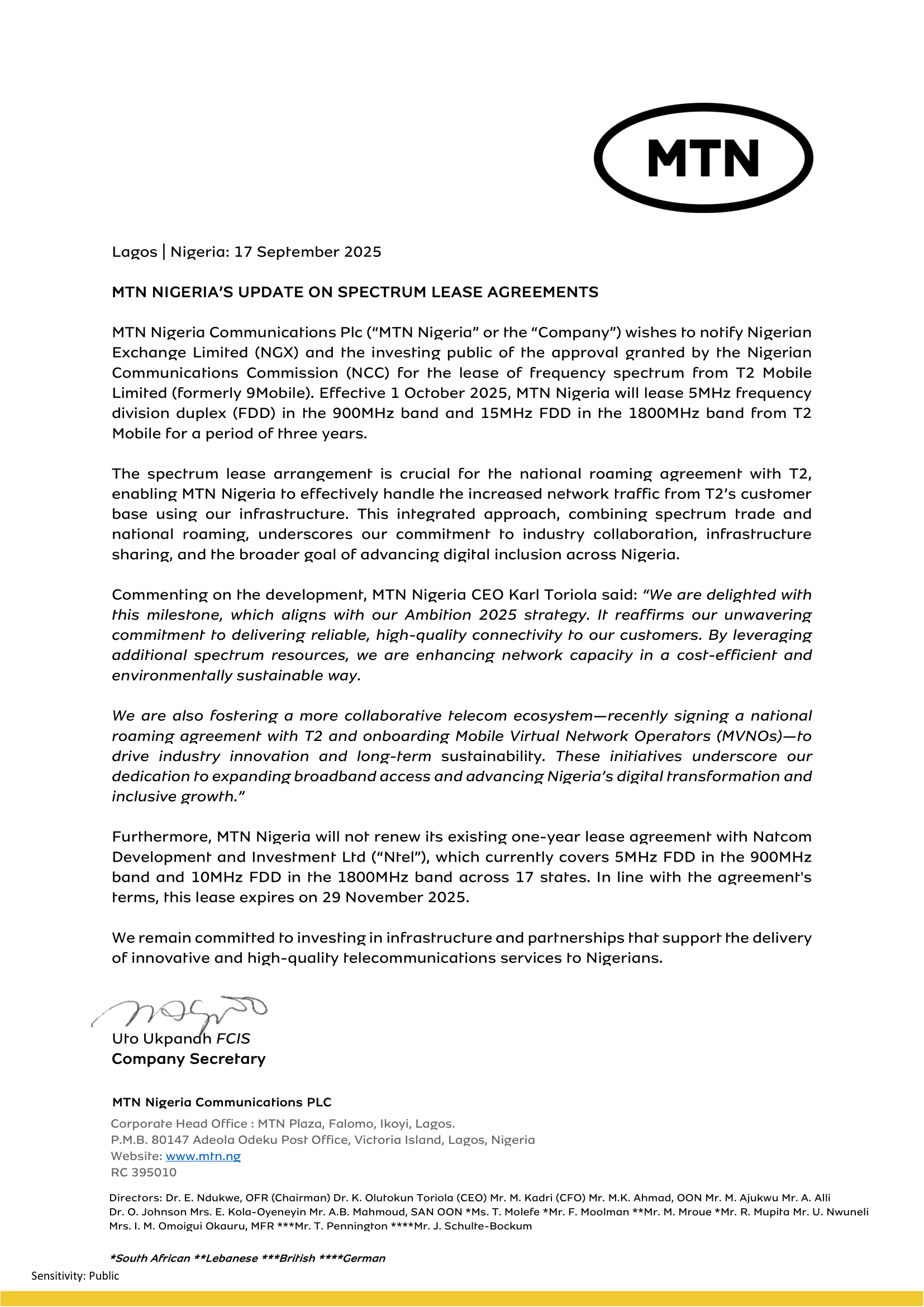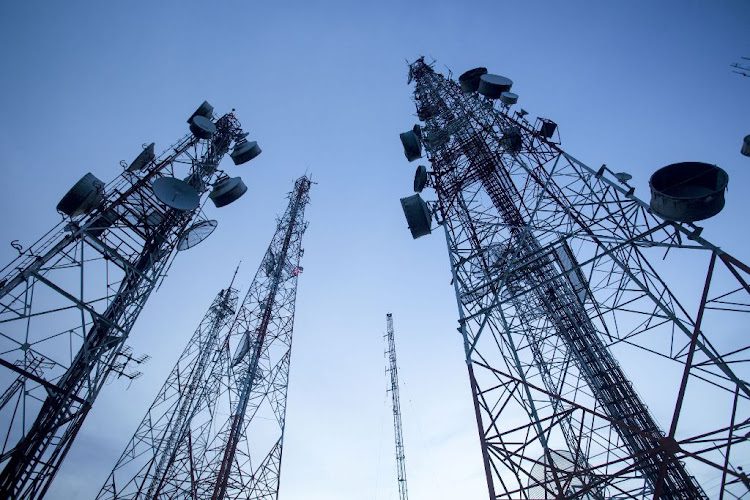MTN Nigeria Communications Plc has announced that it will not extend its one-year spectrum leasing agreement with Natcom Development & Investment Ltd (Ntel) when the contract concludes in November. This lease involved 5 MHz of FDD spectrum in the 900 MHz band and 10 MHz of FDD in the 1800 MHz band, covering 17 states.
In a filing submitted to the Nigerian Exchange, MTN confirmed the lease’s expiration but emphasized its ongoing dedication to enhancing network infrastructure.
“Our commitment remains firm in investing in infrastructure and investment-fao/” title=”Federal Government Launches Massive .14 Billion Agricultural … Partnership with FAO”>forging partnerships that enable the delivery of innovative, high-quality telecommunications services to Nigerians,” the company stated.
The leased spectrum plays a crucial role in mobile communications. The 900 MHz and 1800 MHz frequencies are traditionally utilized for GSM, 3G, and 4G LTE services in Nigeria, providing essential voice and data capabilities.
MTN initially secured approval from the Nigerian Communications Commission (NCC) to utilize Ntel’s spectrum to expand its network capacity and coverage. In 2023, regulators authorized MTN’s lease of Ntel’s 900 MHz and 1800 MHz spectrum assets to enhance 3G and 4G services across 19 states, a deal later extended to nationwide coverage. Consequently, MTN became the primary beneficiary of Ntel’s most valuable spectrum holdings.
 lease spectrum from T2 Mobile” class=”wp-image-261252″ />
lease spectrum from T2 Mobile” class=”wp-image-261252″ />The current one-year lease was a continuation of MTN’s strategy to address rising network traffic demands. However, the company is now pivoting as it secures new spectrum resources.
Coinciding with the announcement of the Ntel lease termination, MTN revealed it has obtained regulatory approval to lease additional spectrum from T2 Mobile (formerly 9Mobile). Starting October 1, 2025, MTN will lease 5 MHz of 900 MHz and 15 MHz of 1800 MHz spectrum from T2 for a three-year term.
This new lease with T2 is integrated into a broader national roaming agreement, enabling MTN to manage increased network traffic generated by T2’s customers utilizing MTN’s infrastructure.
MTN described this arrangement as an “integrated approach, combining spectrum trade and national roaming,” highlighting its dedication to industry collaboration and expanding broadband accessibility.
Essentially, MTN is reallocating its spectrum assets-relinquishing the leased frequencies from Ntel while acquiring comparable or greater spectrum from T2 to sustain and enhance its service quality and coverage.
MTN Nigeria: The Role of Spectrum Leasing in Nigeria’s Telecom Sector
This development reflects a broader pattern within Nigeria’s telecommunications landscape, where operators frequently engage in spectrum leasing and trading to support network growth.
The Nigerian Communications Commission (NCC) has actively promoted spectrum sharing and trading as part of its strategy to improve national connectivity. For instance, the NCC approved MTN’s recent spectrum lease from T2 and is preparing for upcoming spectrum auctions, including those for 5G and the 3.5 GHz band, under the National Broadband Plan.
Spectrum leasing offers telecom companies like MTN rapid access to additional frequencies without the delays and expenses associated with new licenses or auctions. It also facilitates national roaming agreements, as seen in MTN’s collaboration with T2, which aims to ensure seamless service for customers.

MTN emphasized that this strategy aligns with its “Ambition 2025” plan, which focuses on expanding network capacity efficiently and cost-effectively.
Ntel’s position in this ecosystem is significant. As the holder of legacy spectrum and infrastructure from the former state-owned NITEL, Ntel has largely remained inactive as a mobile operator under the Asset Management Corporation of Nigeria (AMCON). Its primary revenue stream has been leasing spectrum to other carriers, with MTN emerging as the predominant user through these agreements.
With MTN’s decision not to renew the lease, Ntel faces the challenge of securing new lessees or potentially relinquishing its spectrum assets. Given Ntel’s financial difficulties and government oversight, this could represent a considerable setback, as leasing has been its most visible form of activity.
For MTN Nigeria, the choice to end the Ntel lease likely signals a strategic shift toward more sustainable partnerships.
Having invested substantially in its own network infrastructure and holding other licensed spectrum, MTN may now consider the leased Ntel frequencies redundant, especially with the addition of spectrum from T2.
MTN reassured stakeholders of its ongoing commitment to network investment, stating, “We remain dedicated to investing in infrastructure and partnerships.”


















0 Comments